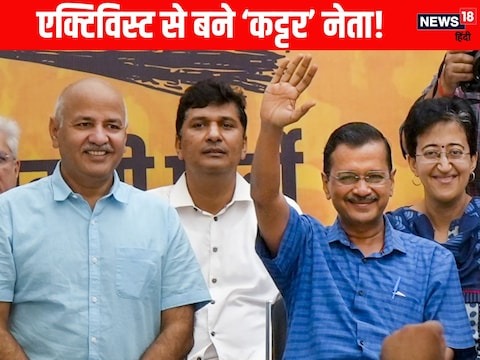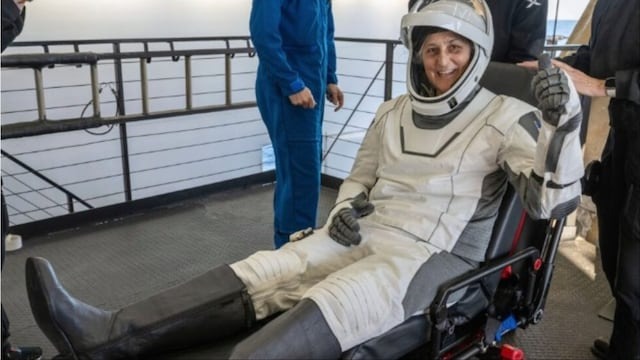
Arvind Kejriwal may have entered politics without any political experience, but today he has become a 'hardcore leader'. He has proved this once again. He came up with the claim of 'changing politics', but it seems that politics itself changed him.
How did Kejriwal become a 'hardcore leader'? The
'masterstroke' played by Arvind Kejriwal on 15 September in his first public meeting after coming out of jail, proved that he has now become a 'hardcore leader'. He announced his resignation from the post of Chief Minister of Delhi on 17 September. The kind of atmosphere he created in his speech before and after this announcement, also showed his 'political maturity' and proved how even adverse circumstances can be turned into an opportunity full of strong possibilities.
Kejriwal has also learned the art of turning problems into opportunities.
Arvind Kejriwal is on bail. According to the conditions of bail, he cannot go to the Chief Minister's Secretariat. Nor can he sign all the important files. That means he has the post of Chief Minister, but no power. In such a situation, announcing resignation will be called a political strategy to gain a lot without losing anything. This strategy can also benefit Kejriwal a lot.
This will be considered a masterstroke by Arvind Kejriwal. The situation that the Aam Aadmi Party is going through, it needs such a masterstroke. The electoral performance of the party is not encouraging, most of its big leaders have been or are in jail for a long time, elections are being held in Haryana, and Delhi elections are getting closer.
How much will the masterstroke work, plan to test it in Haryana
Arvind Kejriwal's resignation strategy can immediately benefit AAP in Haryana. This benefit will be a bonus for the Aam Aadmi Party. The party is contesting on all the seats in the state. If it does not benefit, then the strategy will be tested.
In the context of Delhi, Kejriwal has also demanded that the assembly elections be held earlier, so that the danger of his 'emotional appeal' losing its effect with time can be avoided. Or he does not have to work too hard to maintain the effect till February.
The time for elections in Delhi is February, but Kejriwal demanded that the elections be held in November along with Maharashtra. He did not give any reason as to why they should be held in November.
Where is Bhagat Singh and where is…
Kejriwal has proved himself to be a 'hardcore leader' by comparing his jail term with that of Bhagat Singh. Bhagat Singh was not asking for a certificate from the countrymen for the post of Chief Minister or any other post. Comparing the reason for which he was kept in jail with the reason of any leader being put in jail today is an injustice to that spirit.
Let's talk about practical things!
Kejriwal has said that now the public will give its verdict on his honesty, only then he will sit on the Chief Minister's chair. But, he has probably forgotten or deliberately forgotten that the verdict of the public does not apply in court cases. In the eyes of the court, he is not dishonest even today. Nor has he been asked to leave the CM's chair. Some conditions have definitely been imposed on him as CM. If after the elections, Aam Aadmi Party comes to power and Arvind Kejriwal decides to become the Chief Minister again, then also there is every possibility that today's order of the court (if there is no change in it) will keep him as a half-hearted CM. This can be changed only by the court's order. Also, the real certificate of his being honest or dishonest will also come from the court only.
Kejriwal was arrested in March. He did not decide to resign before going to jail. Although he was not legally bound to do so. This is a question of morality. He decided to become the first leader to go to jail while holding the CM's chair. He remained in jail for about six months. Even during this time, the thought of resignation never came to his mind. He tried to be allowed to perform the responsibility of the Chief Minister from the jail itself. On May 22, 2024, he had also said that he would not resign. The reason behind this was that if he resigned, it would become an example and the central government would put any opposition chief minister in jail, so that he would resign. He repeated the same thing today also. But apart from Kejriwal and Hemant Soren (who had decided to resign before going to jail), many opposition chief ministers are running the government without going to jail and are also doing aggressive politics against the BJP.
When he formed the Aam Aadmi Party by claiming to start a change and a 'new kind of politics', disregarding Anna Hazare's wishes, he had indeed aroused the hope of a 'different kind of politics' among the people of Delhi. The support he received is also an indication of this. But, gradually Kejriwal's politics also started taking on a traditional colour. This colour has only deepened in the last 12 years. The way people saw the Aam Aadmi Party and Arvind Kejriwal himself changing during this period also proves this. It is a different matter that despite this, people have not rejected him.
How did AAP get merged into the crowd of other parties?
Becoming a 'special' man from a common man, forgetting the promise of staying away from red lights, expensive cars, luxurious bungalows, changing the way of running the party, distributing tickets as per one's wish during elections, spending a lot of public money on publicity, making promises many times more than what they actually do (even today in Delhi people are dying by drowning in rainwater on the roads), not giving darshan after winning the election (this was the public's complaint about AAP MLAs in many areas during the Lok Sabha elections in Punjab), there are many such things which show that in the crowd of many parties, Aam Aadmi Party has also become just one party.

 Desk
Desk Share
Share
_939839210.jpg)





